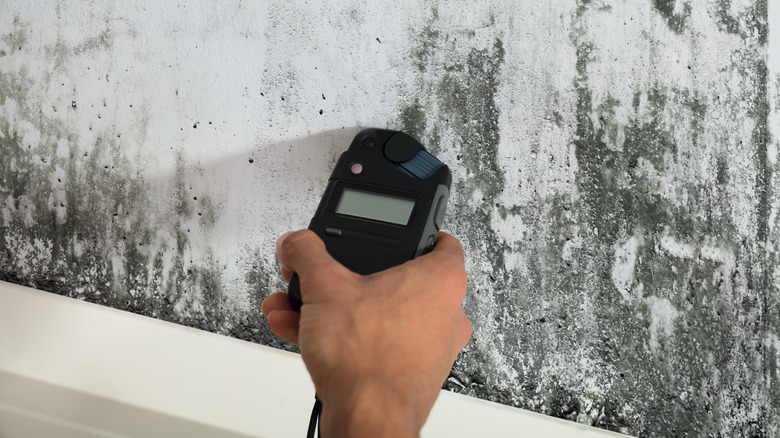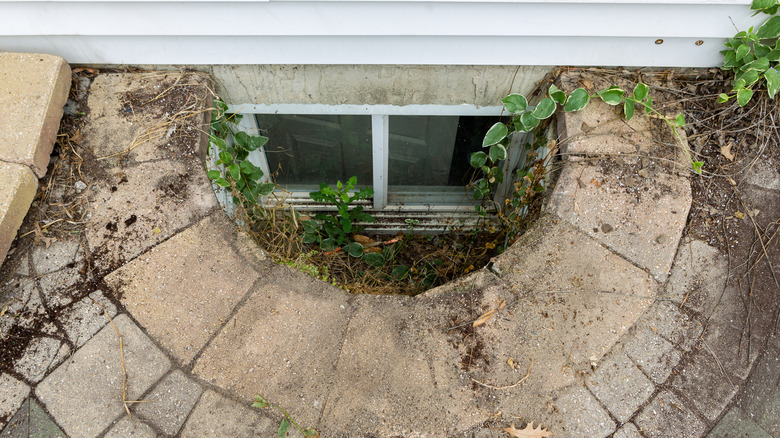The Forgotten Breeding Ground For Mold, Rodents, And Pests In Your Home
Obviously, nobody wants to find mold, rodents, or other pests in their home. To prevent them, most homeowners try to cover their bases by regularly cleaning, maintaining plumbing and appliances, or fixing gaps in wood flooring. But there's one place you may be neglecting, and it happens to be a haven for all manner of pests, problems, and headaches. If your home has a basement or cellar, there's a very good chance you have an egress window and attached window well, as it's required by code for much of the country. They are meant to allow for an easy exit point from below-ground level floors and also provide light, but few people give them much thought after they're installed. That is until they become an issue.
While they're meant as an escape for people, window wells also make excellent traps for some crawling critters such as rats and squirrels or lizards and snakes, which you probably don't want to catch a glimpse of while in the basement. Insects can also make cozy nests in window wells; you may think this is no big deal since they are outside, but these creatures are often opportunistic and will look for a way through the egress window and into your home. Finally, because window wells are subterranean, they tend to run a bit on the moist side, and one thing that thrives in wet conditions is mold and mildew, which can lead to major structural damage.
What attracts all of these issues
One thing that all life requires, from itty bitty bacteria to creepy earwigs and fuzzy possums, is water. Window wells are indeed wells, and so they will naturally be a bit wetter than surface-level soil. This isn't a huge issue unless your window well has standing water. Standing water can occur from a powerful rainstorm, melting snow, or a nearby ground leak if the well is unable to drain properly. The best way to protect your window well and your home against this is through prevention.
Window wells are installed with drains to prevent standing water, but these can become clogged over time, just like any other pipe. That's why regular cleaning and maintenance on these drains is so essential. Every few months, check the window wells for debris, such as leaves and garbage, and remove them — not only do these clog drains, they also provide shelter for insects and pests.
If you live in a particularly wet area, you can also consider getting a window well cover. These are simply shields that ensure water won't enter the wells and have the added benefit of keeping wandering critters out, too. When selecting a cover, look for one made out of durable, rust-proof material such as steel or polycarbonate. Polycarbonate is the best choice if you want to be sure you're still getting plenty of natural light from your basement windows, as it's transparent.
What to do if you have a window well problem
If you notice a bit of mold or mildew in your well, it's important to assess if the mold has spread inside the basement. Luckily, if you're performing regular maintenance, it should be fairly minor. Tackle the mold with one part bleach to four parts water, apply it to the mold with a spray bottle or rag, wipe it away, then dry the area well. A lot of pests can be removed manually, especially when it comes to non-venomous species like your garden variety cockroaches and centipedes. But you can also go the bug-bombing route with a bottle of pest removal spray such as Raid, or you can call in a professional for a particularly nasty infestation.
How to deal with other critters that may have fallen into your window well will vary from person to person. You can try traditional traps, but some may prefer a catch-and-release method. You can always buy a live trap, or create a makeshift one with a bucket and broom; just use a broom to usher the animal into the bucket — this is a great choice for any animals you want to set free after removing from the window well or if an animal is injured. Some animals like possums and raccoons can crawl out on their own if you lower in a smooth board! You can also call a local wildlife removal service, animal rescue, or animal control if you prefer.

